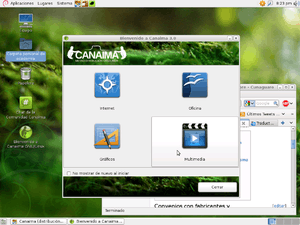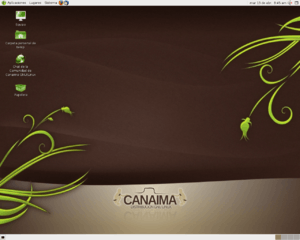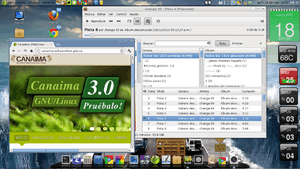Canaima (operating system)
Canaima GNU/Linux is an open source operating system. It is a Linux distribution based on the architecture of Debian. It was created as a solution to cover the needs of the Venezuelan Government as a response to presidential decree 3,390 that prioritizes the use of free and open source technologies in the public administration. On March 14, 2011, Canaima was officially established as the default operating system for the Venezuelan public administration.[2]
 Canaima Popular 3.0 (Roraima) | |
| Developer | CANTV / CNTI / CENTIDEL / Edelca / VIT / FUNDACITE / Free software community |
|---|---|
| OS family | Unix-like |
| Working state | Current |
| Source model | Open source |
| Initial release | 18 October 2007 |
| Latest release | 6.0 Kavac / 19 March 2018[1] |
| Available in | Venezuelan Spanish |
| Update method | APT (several front-ends available) |
| Package manager | dpkg |
| Platforms | IA-32, x86-64 |
| Kernel type | Monolithic (Linux kernel) |
| Userland | GNU |
| Default user interface | Cinnamon and MATE[1] |
| License | Free software licenses (mainly GPL) |
| Official website | canaima |
The operating system has gained a strong foothold and is one of the most used Linux distributions in Venezuela, largely because of its incorporation in public schools.[3][4] It is being used in large scale projects as "Canaima Educativo", a project aimed at providing school children with a basic laptop computer with educational software nicknamed Magallanes.[5] Use of Canaima has been presented on international congresses about the use of open standards,[6] Despite being a young development, it has been used on the Festival Latinoamericano de Instalación de Software Libre (FLISOL).[7]
In February 2013 DistroWatch ranked it the 185th most popular Linux distribution among 319 for the last 12 months.[8]
Features
Some of the major features of Canaima GNU/Linux are:
- Easy installation
- Software license cost is free.
- Free distribution and use.

The Free Software Foundation (FSF) states that Canaima GNU/Linux is not 100% free software. This is because of the fact that some of its components are nonfree software, in particular some firmware needed for graphic cards, sound cards, printers, etc. Canaima creators opted to include these nonfree drivers in order to support as many computers being used by the Venezuelan government as possible, and to facilitate the migration from a closed source operating system to an open source but nonfree one. It is expected that Canaima, in its upcoming releases, offers an option in the installation process for nonfree drivers to be optional, being able to install a 100% free software image of the distribution if the user choose to.
Included Software
Canaima includes applications for training, development and system configuration. The Graphical User Interface (GUI) and desktop environment by default is GNOME. There are other desktop environments and GUIs maintained by the community for the system, like Xfce.
Productivity: The office software suite LibreOffice, with word processor, spreadsheet, presentation program, it includes other more specific programs like project management software Planner and a HTML editor.

Internet: Includes the Cunaguaro browser, a web browser based on Iceweasel and adapted especially for Canaima 3.0 and onwards. Canaima Curiara, is a light web browser based on Cunaguaro, developed in python-webkit for specific applications on the distribution.
Graphics: Includes Gimp, Inkscape, desktop publishing software Scribus and gLabels labels designer.
The full list of included software can be found at here.
Releases
Canaima has been releasing stable versions periodically since the last couple of years.[9]
| Version | Codename | Release date |
|---|---|---|
| 1.0 | Canaima | 2007-10-18 |
| 2.0 | Canaima | 2009-02-05[10] |
| 2.0.1 RC1 | Canaima | 2009-04-16[11] |
| 2.0.1 | Canaima | 2009-05-15[12] |
| 2.0.2 | Canaima | 2009-05-22 |
| 2.0.3 | Canaima | 2009-07-03[13] |
| 2.0.4 | Canaima | 2009-10-17 |
| 2.1 RC | Canaima | 2010-05-21[14] |
| 3.0 RC | Roraima | 2011-02-10[15] |
| 3.0 RC2 | Roraima | 2011-02-22[16] |
| 3.0 | Roraima | 2011-05-05 |
| 3.1 VC1 | Auyantepui | 2011-12-29[17] |
| 3.1 VC2 | Auyantepui | 2012-07-06[18] |
| 3.1 VC3 | Auyantepui | 2012-07-18[19] |
| 3.1 | Auyantepui | 2012-11-14[20] |
| 4.0 | Kerepakupai | 2013-12-04[21] |
| 4.1 | Kukenán | 2014-09-04[22] |
| 5.0 | Chimantá | 2016-12-19[23] |
| 6.0 | Kavac | 2018-03-18[24] |
| 6.0.3 | Kavac | 2018-04-18 |
| 6.1.1 | Kavac | 2019-08-26 |
| 7.0 | Imawarí | 2020 |
| Color | Significance | |
| Red | Old version. | |
| Yellow | Older version, still supported. | |
| Green | Latest version. | |
| Blue | Future release. | |
Development Cycle
Canaima uses a development model based on Debian, but some modifications were made to adapt it to Venezuelan needs. Therefore, the development cycle has the following components:
- Socio-productive community: integrated by the Free Software Community, entities of the public administration, organized collectives and universities.
- Tools for the support of the communities composed by:
- A forge based on FusionForge located at https://web.archive.org/web/20190611111637/http://forja.softwarelibre.gob.ve/
- A tool for project management and bug tracking based on Trac located at https://web.archive.org/web/20121126005534/http://proyectos.canaima.softwarelibre.gob.ve/
- Consolidation and automated testing phase: which are based on software quality testing and evaluation criterion. This stage has an extensive use of Debian tools such as pbuilder,[25] elida in the infrastructure upon which rests.[26]
- Certification phase: in which a committee of community members proceed to make tests of functionality, check statistics, etc., in order to release a stable version.
Cayapa Canaima
One of the community activities that has been generated around Canaima is the Cayapa. Cayapa is a Venezuelan term that stands as a form of cooperative work made by several people to reach one goal.[27] On these meetings, free software developers get together to propose upgrades and fix bugs among other things; this activity is called a Bug Squash Party in other projects. The last Cayapa was conducted from May 14 until May 15, 2012 in the city of Barinas.[28]
OEMs
Being a distribution promoted by the Venezuelan Government, a certain number of strategic agreements have been generated with several countries and manufacturing hardware companies:
- Portugal: Agreement for the manufacturing of 250,000 "Magalhães" computers to be distributed on public schools
- Sun Microsystems: for the certification of Canaima devices from this manufacturer.[29]
- VIT, C.A.: Venezolana de Industria Tecnológica, mixed-enterprise between the Venezuelan state and Chinese entrepreneurs in which it established the use of Canaima on the devices that are manufactured.[30]
- Lenovo: For the certification of devices from the manufacturer for the use of Canaima.[31]
- Siragon, C.A.: Venezuelan manufacturer of computer equipment, an agreement from which Canaima is certified for use on their devices.[32]
Use of Canaima
The most successful instances of the use and adoption of Canaima:
Canaima Educativo
It is a project initiated in 2009 by the Venezuelan Ministry of Education (Ministerio del Poder Popular para la Educación) that provides students in primary education with a laptop computer, known as Canaimitas, with free software, using the Canaima operating system and a series of educational content created by the Ministry of Education.[33]
In 2011, 1,314,091 laptops were acknowledged as being delivered.[34]
CANTV
The national telephone company, CANTV, uses the operating system to a certain extent according to their Equipped Internet Plan.
Variants
There are a number of Canaima editions, maintained and recognized by community activists,[35] that are not released at the same time as the official distribution and do not take part in the project schedule. The most significant ones are:
- Canaima Colibri, a Venezuelan distribution with the goals of being friendly, light and functional for computers with low resources.
- Canaima Comunal, the idea behind this edition is that it can be extended by community councils, a form of community government called "Consejos Comunales". The main aim is to deliver an operating system to the people in these councils for their everyday work, including tools for surveys among others.
- Canaima Caribay, aimed at community media that has flourished because of government support, since the Venezuelan government sees most private media outlets as being heavily biased.
- GeoCanaima contains free Geomatics applications and data to perform various practices and interact with desktop applications, web servers and mapping generators.
- Canaima Forense, a new user-friendly environment containing a variety of useful tools for computer forensics.
References
- "Disponible versión estable de Canaima GNU/Linux 6.0 "Kavac"". MPPCTI. Archived from the original on 12 August 2018. Retrieved 10 January 2017.
- "Canaima GNU/Linux". DistroWatch.com.
- http://www.rnv.gov.ve/noticias/index.php?act=ST&f=19&t=106420&hl=canaima&s=5f203b6ca55b49bfbbdb85019efce5f7 Archived 20 August 2011 at the Wayback Machine Use of Canaima in schools
- "Canaima cambios recientes". Archived from the original on 2 December 2013. Retrieved 25 November 2013.
- http://www.cnti.gob.ve/index.php?option=com_content&view=article&id=778:portugal-enviara-250-mil-computadoras-portatiles-a-venezuela-en-el-ano-2009&catid=44:nacionales&Itemid=88 Portugal to send 250,000 laptops to Venezuela in the year 2009
- http://www.rnv.gov.ve/noticias/index.php?act=ST&f=14&t=106285&hl=canaima&s=5f203b6ca55b49bfbbdb85019efce5f7%5B%5D Venezuela participates on II Congreso Internacional Software Libre
- http://www.rnv.gov.ve/noticias/index.php?act=ST&f=14&t=95808&hl=canaima&s=5f203b6ca55b49bfbbdb85019efce5f7%5B%5D Free installation of free software in over 200 cities of Latin-America
- "DistroWatch Page Hit Ranking". Distrowatch. Retrieved 25 November 2013.
- Equipo Canaima GNU/Linux, CNTI (17 November 2012). "Evolución de Canaima en Distrowatch" (in Spanish). Retrieved 26 February 2013.
- Equipo Canaima GNU/Linux, CNTI (5 February 2009). "Liberada Canaima Popular versión 2.0" (in Spanish). Archived from the original on 8 May 2015. Retrieved 26 February 2013.
- Equipo Canaima GNU/Linux, CNTI (16 April 2009). "Development Release: Canaima GNU/Linux 2.0.1 RC1 (DistroWatch.com News)" (in Spanish). Retrieved 26 February 2013.
- Equipo Canaima GNU/Linux, CNTI (15 May 2009). "Lanzamiento de Canaima versión 2.0.1" (in Spanish). Archived from the original on 29 November 2014. Retrieved 26 February 2013.
- Equipo Canaima GNU/Linux, CNTI (15 May 2009). "Lanzamiento oficial de Canaima versión 2.0.3" (in Spanish). Archived from the original on 29 November 2014. Retrieved 26 February 2013.
- Equipo Canaima GNU/Linux, CNTI (21 May 2010). "Lanzamiento de Canaima versión 2.1 RC" (in Spanish). Archived from the original on 29 November 2014. Retrieved 26 February 2013.
- Equipo Canaima GNU/Linux, CNTI (10 February 2011). "Lanzamiento de la Primera Versión Candidata para Canaima 3.0" (in Spanish). Archived from the original on 11 June 2015. Retrieved 26 February 2013.
- Equipo Canaima GNU/Linux, CNTI (22 February 2011). "Anunciamos la disponibilidad de la Segunda Versión Candidata (VC2) de Canaima 3.0" (in Spanish). Archived from the original on 29 November 2014. Retrieved 26 February 2013.
- Equipo Canaima GNU/Linux, CNTI (29 December 2011). "Primera Versión Candidata de Canaima Popular 3.1 (auyantepui)" (in Spanish). Archived from the original on 13 July 2014. Retrieved 26 February 2013.
- Equipo Canaima GNU/Linux, CNTI (6 July 2012). "Presentamos la Segunda Versión Candidata de Canaima Popular 3.1, nombre código "Auyantepui"" (in Spanish). Archived from the original on 3 June 2015. Retrieved 26 February 2013.
- Equipo Canaima GNU/Linux, CNTI (18 July 2012). "Actualiza a la Tercera Versión Candidata de Canaima Popular" (in Spanish). Archived from the original on 5 July 2014. Retrieved 26 February 2013.
- Equipo Canaima GNU/Linux, CNTI (14 November 2012). "Lanzamiento oficial de la nueva versión estable del Sistema Canaima GNU/Linux 3.1. Nombre código "Auyantepuy"" (in Spanish). Archived from the original on 5 July 2014. Retrieved 26 February 2013.
- Equipo Canaima GNU/Linux, CNTI (14 January 2013). "Inició el Ciclo de Desarrollo de Canaima 4.0 "Kerepakupai"" (in Spanish). Archived from the original on 5 July 2014. Retrieved 26 February 2013.
- Equipo Canaima GNU/Linux, CNTI (14 September 2014). "Canaima Popular 4.1 (04/09/2014)" (in Spanish). Archived from the original on 23 October 2015. Retrieved 22 July 2017.
- Equipo Canaima GNU/Linux, CNTI (19 December 2016). "Canaima Poder Público 5.0 (19/12/2014)" (in Spanish). Archived from the original on 7 November 2018. Retrieved 22 July 2017.
- Equipo Canaima GNU/Linux, CNTI (19 March 2018). "Canaima Poder Público 6.0 (19/03/2018)" (in Spanish). Archived from the original on 21 September 2018. Retrieved 12 August 2018.
- Anibal Monsalve Salazar (10 September 2005). "Que es pbuilder" (in Spanish). Retrieved 26 February 2013.
- Lucas Nussbaum. "Use of Grid Computing for Debian Quality Assurance" (PDF). Archived from the original (PDF) on 1 April 2010. Retrieved 26 February 2013.
- http://lema.rae.es/drae/?val=cayapa Definición de Cayapa, apartado No. 5
- "6ta Cayapa Canaima: Barinas 2012". Cayapa Canaima. Archived from the original on 16 November 2012.
- CENTRO NACIONAL DE TECNOLOGÍAS DE INFORMACIÓN (CNTI) (18 November 2008). "CONVENIO MARCO DE COOPERACIÓN TECNOLÓGICA CNTI- SUN MICROSYSTEMS DE VENEZUELA, S.A." (PDF) (in Spanish). Retrieved 26 February 2013.
- CENTRO NACIONAL DE TECNOLOGÍAS DE INFORMACIÓN (CNTI) (15 July 2008). "CONVENIO MARCO DE COOPERACIÓN TECNOLÓGICA CNTI-VIT" (PDF) (in Spanish). Retrieved 26 February 2013.
- CENTRO NACIONAL DE TECNOLOGÍAS DE INFORMACIÓN (CNTI) (15 July 2008). "CONVENIO MARCO DE COOPERACIÓN TECNOLÓGICA CNTI-LENOVO" (PDF) (in Spanish). Retrieved 26 February 2013.
- CENTRO NACIONAL DE TECNOLOGÍAS DE INFORMACIÓN (CNTI) (17 November 2008). "CONVENIO MARCO DE COOPERACIÓN TECNOLÓGICA CNTI-MICROINTEGRADORA DE VENEZUELA, C.A." (PDF) (in Spanish). Retrieved 26 February 2013.
- "Venezuela: Presentan proyecto "Canaima Educativo"". Retrieved 2 February 2012.
- "Más de un millón 300 mil Canaimitas se han entregado a niños de educación básica". Archived from the original on 8 August 2016. Retrieved 2 February 2012.
- colaboradores de la Enciclopedia Colaborativa de la Comunidad Canaima. "Sabores de Canaima" (in Spanish). Archived from the original on 16 November 2012. Retrieved 26 February 2013.
External links
| Wikimedia Commons has media related to Canaima. |